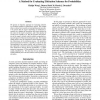Free Online Productivity Tools
i2Speak
i2Symbol
i2OCR
iTex2Img
iWeb2Print
iWeb2Shot
i2Type
iPdf2Split
iPdf2Merge
i2Bopomofo
i2Arabic
i2Style
i2Image
i2PDF
iLatex2Rtf
Sci2ools
109
click to vote
FLAIRS
2001
2001
A Method for Evaluating Elicitation Schemes for Probabilities
We present an objective approach for evaluating probability elicitation methods in probabilistic models. Our method draws on ideas from research on learning Bayesian networks: if we assume that the expert's knowledge is manifested essentially as a database of records that have been collected in the course of the expert's experience, and if this database of records were available to us, then the structure and parameters of the expert's beliefs could be reliably constructed using techniques for Bayesian learning from data. This learned model could, in turn, be compared to elicited models to judge the effectiveness of the elicitation process. We describe a general procedure by which it is possible to capture the data corresponding to the expert's beliefs, and we present a simple experiment in which we utilize this technique to compare three methods for eliciting discrete probabilities: (1) direct numerical assessment, (2) the probability wheel, and (3) the scaled prob...
Artificial Intelligence | FLAIRS 2001 | Probability Elicitation | Probability Elicitation Methods | Scaled Probability Bar |
Related Content
| Added | 31 Oct 2010 |
| Updated | 31 Oct 2010 |
| Type | Conference |
| Year | 2001 |
| Where | FLAIRS |
| Authors | Haiqin Wang, Denver Dash, Marek J. Druzdzel |
Comments (0)

